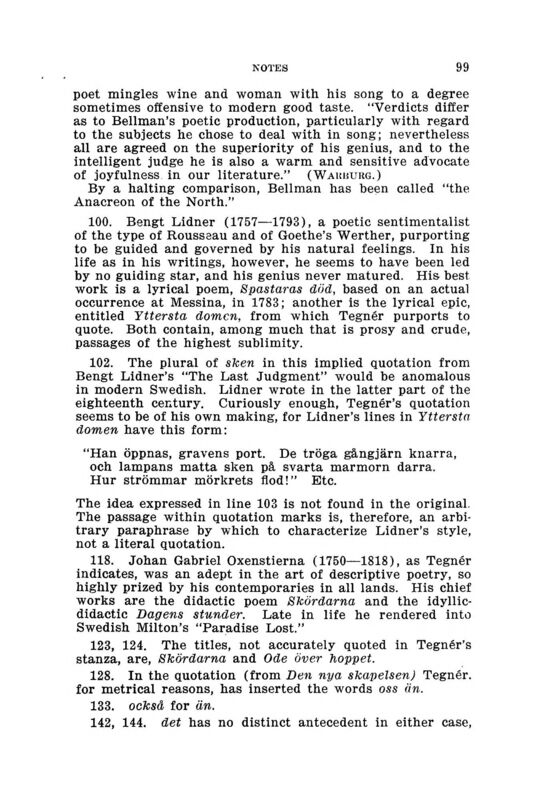
Full resolution (JPEG) - On this page / på denna sida - Sidor ...

<< prev. page << föreg. sida << >> nästa sida >> next page >>
Below is the raw OCR text
from the above scanned image.
Do you see an error? Proofread the page now!
Här nedan syns maskintolkade texten från faksimilbilden ovan.
Ser du något fel? Korrekturläs sidan nu!
This page has never been proofread. / Denna sida har aldrig korrekturlästs.
NOTES 99
poet mingles wine and woman with his song to a degree
sometimes offensive to modern good taste. ’Verdicts differ
as to Bellman’s poetic production, particularly with regard
to the subjects he chose to deal with in song; nevertheless
all are agreed on the superiority of his genius, and to the
intelligent judge he is also a warm and sensitive advocate
of joyfulness. in our literature.” (WARBURG.)
By a halting comparison, Bellman has been called "the
Anacreon of the North.”
100. Bengt Lidner (1757—1793), a poetic sentimentalist
of the type of Rousseau and of Goethe’s Werther, purporting
to be guided and governed by his natural feelings. In his
life as in his writings, however, he seems to have been led
by no guiding star, and his genius never matured. His best
work is a lyrical poem, Spastaras död, based on an actual
occurrence at Messina, in 1783; another is the lyrical epic,
entitled Yttersta domen, from which Tegnér purports to
quote. Both contain, among much that is prosy and crude,
passages of the highest sublimity.
102. The plural of sken in this implied quotation from
Bengt Lidner’s "The Last Judgment” would be anomalous
in modern Swedish. Lidner wrote in the latter part of the
eighteenth century. Curiously enough, Tegnér’s quotation
seems to be of his own making, for Lidner’s lines in Yttersta
domen have this form:
"Han öppnas, gravens port. De tröga gångjärn knarra,
och lampans matta sken på svarta marmorn darra.
Hur strömmar mörkrets flod!” Etc.
The idea expressed in line 103 is not found in the original.
The passage within guotation marks is, therefore, an
arbitrary paraphrase by which to characterize Lidner’s style,
not a literal quotation.
118. Johan Gabriel Oxenstierna (1750—1818), as Tegnér
indicates, was an adept in the art of descriptive poetry, so
highly prized by his contemporaries in all lands. His chief
works are the didactic poem Skördarna and the
idyllicdidactie Dagens stunder. Late in life he rendered into
Swedish Milton’s "Paradise Lost.”
123, 124. The titles, not accurately quoted in Tegnér’s
stanza, are, Skördarna and Ode över hoppet.
128. In the quotation (from Den nya skapelsen) Tegnér.
for metrical reasons, has inserted the words oss än.
1383. också for än.
142, 144. det has no distinct antecedent in either case,
<< prev. page << föreg. sida << >> nästa sida >> next page >>